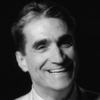Robert Pinsky

Robert Pinsky
Robert Pinskyis an American poet, essayist, literary critic, and translator. From 1997 to 2000, he served as Poet Laureate Consultant in Poetry to the Library of Congress. Pinsky is the author of nineteen books, most of which are collections of his poetry. His published work also includes critically acclaimed translations, including The Inferno of Dante Alighieri and The Separate Notebooks by Czesław Miłosz. He teaches at Boston University...
NationalityAmerican
ProfessionPoet
Date of Birth20 October 1940
CityLong Branch, NJ
CountryUnited States of America
Vivid and reflective, documentary and visionary, re-imagining the city of New York with the same urgency that ponders the opening words of Genesis, this is a passionate, artful and re-readable book.
Poetry is a vocal art for me - but not necessarily a performative one. It might be reading to oneself or recalling some lines by memory.
I think my first experience of art, or the joy in making art, was playing the horn at some high-school dance or bar mitzvah or wedding, looking at a roomful of people moving their bodies around in time to what I was doing. There was a piano player, a bass player, a drummer, and my breath making the melody.
I think art is not an ornament or refinement at the fringes of human intelligence, I think it's at the center. It's at the core.
For an American, there's no automatic place where people love the art of poetry. There's not a social class that considers poetry its property the way in some countries there's a snob value to the art.
For a lot of people, well-meaning teaching has made poetry seem arcane, difficult, a kind of brown-knotting medicine that might be good for you but doesn't taste so good. So I tried to make a collection of poetry that would be fun. And that would bring out poetry as an art, rather than the challenge to say smart things.
Poetry is the most bodily of the arts.
The last thing a young artist should do in poetry or any other field is think about whats in style, whats current, what are the trends. Think instead of what you like to read, what do you admire, what you like to listen to in music. What do you like to look at in architecture? Try to make a poem that has some of those qualities.
An artist needs not so much an audience, as to feel a need to answer, a promise to respond....a good feeling about his art.
The medium of poetry is a human body: the column of air inside the chest, shaped into signifying sounds in the larynx and the mouth. In this sense, poetry is just as physical or bodily an art as dancing.
Art will not solve your problems. It will not enable you to live merrily.
If what you want to do is make good art, decide whats good and try to imitate it.
'Write' is almost the wrong verb for what I do. I think 'compose' is more accurate because you're trying to make the sounds in your mind and in your voice. So I compose while I'm driving or in the shower.
I am a frustrated saxophone player. If I could, I would abandon all of my books, and I would trade it all if I could play the way people I admire play.